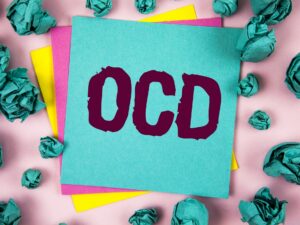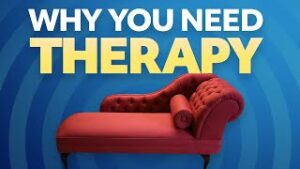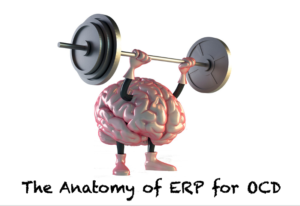Are you struggling with obsessive-compulsive disorder? Are you looking for a way to get relief from your symptoms? If so, ERP therapy may be the right solution for you. ERP, or exposure and response prevention therapy, is a type of cognitive-behavioral therapy that is effective in treating OCD. In this blog post, we will discuss what ERP therapy is and how it can help you overcome your OCD symptoms.
Contents
What Is ERP Therapy?
ERP is a form of psychotherapy that helps people manage their OCD by gradually exposing them to the things they fear and avoiding compulsive behaviors.
The goal of ERP is to help people become less afraid of their obsessions and more able to tolerate the discomfort that comes with them.
ERP usually requires weekly sessions with a trained therapist, but it can be done on an outpatient basis.
What Is OCD?
Obsessive-compulsive disorder (OCD) is a type of anxiety disorder. People with OCD have repeated, unwanted thoughts, ideas, or sensations (obsessions) that make them feel driven to do something repetitively (compulsions).
OCD often begins in adolescence or young adulthood, but it can also begin in childhood or later in life. It occurs in both men and women and affects people of all races and ethnicities.
Different types of obsessions and compulsions can be experienced with OCD. Some people may only have obsessions while others may only have compulsions. Some people may have both obsessions and compulsions.
The most common obsessions include:
- Fear of contamination or dirt
- Fear of germs or illness
- Excessive focus on orderliness, symmetry, and/or exactness
- Unwanted intrusive thoughts about violence, sex, or religious topics
- Intrusive thoughts about harming oneself or others
Compulsions are repetitive behaviors that a person feels driven to do in response to an obsession. The goal of these compulsions is to reduce the anxiety that is caused by the obsessions.
When To Seek ERP To Heal From OCD?
There is no one answer to this question as it depends on the individual and their unique situation. However, some general guidelines can be followed.
- Generally speaking, ERP should be considered when other treatment options have failed to provide relief from OCD symptoms. This could mean that you have tried medication and/or traditional talk therapy, but your symptoms have persisted. If you feel like you’ve tried everything and nothing has worked, ERP may be worth considering.

- Another factor to consider is the severity of your symptoms. If your OCD is severely impacting your quality of life, it may be necessary to try a more intensive treatment like ERP. This is because ERP can be a very time-consuming and challenging treatment, and it may not be realistic for someone with milder symptoms.
- Finally, the last factor is your willingness to commit to the treatment. ERP requires a great deal of dedication and hard work, and it is not possible to see results without putting in the effort. If you are not willing to put in the time and energy required, ERP may not be the right treatment for you.
If you are considering ERP therapy for OCD, it is important to consult with a mental health professional who can help you assess whether or not it is right for you. Only a trained professional can give you a comprehensive evaluation and provide guidance on which treatment options are most likely to be effective for your unique situation.
How Does ERP Work For OCD? 
ERP works in the following manner for managing and recovering from OCD.
- Exposure and response prevention (ERP) is a type of cognitive-behavioral therapy that helps people with OCD manage their obsessions and compulsions. ERP is based on the idea that exposure to your triggers whether it’s seeing, touching, or thinking about your trigger can help you learn to control your anxiety.
- Response prevention is when you resist the urge to do your compulsions. This might mean not washing your hands after coming into contact with something you’re afraid of contaminating, or not checking the locks on your doors over and over again. By learning to control your anxiety without relying on compulsions, you can start to break the cycle of OCD.
- ERP therapy usually starts with education about OCD and how it works. Then, you and your therapist will work together to come up with a list of your triggers and the level of anxiety they cause. You’ll start with the least anxiety-provoking trigger on the list and work your way up.
- For each trigger, you’ll be exposed to it for a set period whether it’s several seconds or several minutes without giving in to your compulsions. This might be hard at first, but over time, you should find that your anxiety decreases and you’re better able to control your compulsions.
- Furthermore, your therapist will likely teach you some cognitive strategies to help you deal with your obsessions and anxiety. For example, you might learn how to challenge your thinking patterns when you have an intrusive thought.
ERP works by gradually exposing the person to their triggers without letting them perform their compulsions. This may sound like it would make the OCD worse, but it has the opposite effect. By slowly exposing themselves to their triggers and learning to control their anxiety, people with OCD can eventually break free from the cycle of OCD.
If you’re struggling with OCD, talk to a mental health professional about whether ERP therapy might be right for you.
What Are The Benefits?
The various benefits of ERP therapy in relieving OCD are explained below in great detail:
Reduction in Intensity Of Symptoms 
ERP therapy can help in reducing the overall intensity and frequency of your obsessions and compulsions. It can also assist you in learning how to better manage and cope with your OCD symptoms.
Identification Of Healthy Coping Skills
ERP therapy can also help you to identify and challenge any negative or distorted thoughts that contribute to your OCD symptoms. This form of therapy can also teach you healthy coping mechanisms and problem-solving skills to deal with future OCD flare-ups.
Everything returning to normal
ERP therapy is highly effective in treating OCD, with many people reporting significant symptom relief after completing this form of treatment. It gives you back the control over your life that OCD had stolen from you.
Improvement in relationships
It can help improve your relationships, work performance, and overall quality of life.
ERP therapy can help individuals with OCD to develop healthier and more functional relationships. This can lead to improved relationships with friends, family, and significant others. For example, ERP can help an individual with OCD who is afraid of contamination to challenge their beliefs about germs and dirt.
They may be able to see that not all germs are harmful and that it’s okay to get dirty sometimes. This new perspective can then carry over into their relationships, allowing them to be more relaxed and less fearful around others.
ERP therapy is a highly effective treatment for OCD that can provide long-lasting relief from this debilitating disorder. Overall, ERP therapy is an extremely effective treatment option for those suffering from OCD, offering long-lasting relief from the condition. If you think you might benefit from this type of therapy, be sure to speak with a mental health professional about it today.
What Are The Limitations?
ERP is not devoid of drawbacks. Some of its limitations are:
Takes Time To Show Results
One of the key things to understand about ERP therapy is that it takes time to work. This is because the goal of ERP is to help you learn how to manage your OCD symptoms healthily.
That means slowly exposing yourself to the things that trigger your OCD and learning how to cope with the anxiety that comes with it. This process can take weeks or even months, depending on the severity of your OCD. In some cases, people may need to continue with ERP therapy for several months or even years to maintain their symptom relief.
Doesn’t Work For All
ERP therapy does not work for everyone; some people may find that their symptoms are only partially relieved by this type of treatment. There are several reasons why ERP therapy may not work for everyone.
One reason is that the therapist and patient may not be able to identify all of the patient’s obsessions and compulsions. Another reason is that the therapist may not be experienced in providing this type of treatment. Finally, some people may simply not respond to this type of therapy.
Triggers The Difficult Phase Of Life
Because ERP therapy requires exposure to the things that trigger your OCD symptoms (e.g., dirt, germs, etc.), it can be difficult and uncomfortable to stick with this type of treatment.
One of the main reasons why people may discontinue ERP therapy is that it can be difficult to face your fears head-on. It can be tempting to avoid the things that make you anxious or uncomfortable, but this only reinforces your OCD symptoms and makes them worse in the long run. ERP therapy requires you to confront your fears and compulsions, which can be difficult to do.
However, it is important to stick with treatment to see results. Many people who persevere with ERP therapy find that it significantly reduces their OCD symptoms and improves their quality of life.
What Things To Consider Before Taking ERP?
If you’re ready to take the next step in your journey to recovery from OCD, contact a mental health professional today and ask about ERP therapy. It could be the key to finally getting the relief you need. Before stepping ahead in your journey towards healing from OCD, keep in mind the following points:
Consult an experienced professional
The first thing to keep in mind is that ERP therapy should only be used as directed by a mental health professional. It’s important to find a therapist who specializes in OCD and who has experience using ERP therapy. They will be able to help you tailor the therapy to your specific needs.
Have Patience
Another important thing to keep in mind is that ERP therapy takes time and commitment. It can be difficult and challenging at times, but it is important to stick with it. The more you practice, the better your results will be.
Ask Your Doubts
If you are considering ERP therapy for OCD, be sure to talk to your mental health professional about it. They can help you decide if it is right for you and give you more information on what to expect. ERP therapy can be a great way to get relief from OCD symptoms, but it is important to go into it with realistic expectations and a commitment to stick with it.
You can ask the following questions to your therapist before your session:
- How long have you been practicing ERP?
- What is your experience with treating OCD?
- How do you tailor ERP to each patient?
- What are the success rates of your patients with OCD after completing therapy?
- What should I expect during and after therapy sessions?
Be sure to also ask about any potential risks or side effects of ERP before starting therapy. While it is generally a safe and effective treatment, there is always a chance that something could go wrong. It’s important to be as informed as possible before making any treatment decisions.
Conclusion
ERP therapy is a great way to heal from OCD. However, it is not the only factor to be considered and should not be the first line of treatment. It is important to consult with a mental health professional to get help in deciding which treatment options are most likely to work for your case.
ERP is a form of exposure and response prevention, which helps people with OCD confront their fears and learn to control their reactions to them. Only a trained mental health professional can give you a comprehensive evaluation and provide guidance on which treatment option is best for you.
Overall, ERP therapy provides several benefits that can help organizations improve their performance and achieve their goals. After all, your healthy life is the most important thing which you should consider first before anything else. Take the necessary steps to get the help you need to live the life you want.
Professional Guidance is the first step to moving toward your healing journey. You can try reaching Therapy Mantra to seek expert help in the comfort of your own home. Our therapists will help you get a solution to manage and overcome your problem. You can book your online therapy and talk directly to your assigned mentor. You may also download our free OCD treatment app on Android or iOS.









